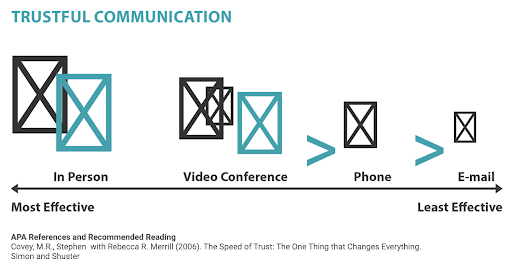DYNAMIC LEADERSHIP | ON-DEMAND COURSES
The Importance of Trust in an Organization
Trust is the foundation of a great workplace. Earning employees’ trust is essential to being a successful leader. And as a leader, your actions can build or destroy employee trust.
Stephen Covey, author of The 7 Habits of Highly Effective People, explains that developing trust has the capacity to increase the speed and efficiency of your employees and thus decrease costs. When coworkers trust one another, they work with improved speed and efficiency, which reduces costs because they can get more things done. Similarly, a lack of trust decreases speed and increases costs. When coworkers lack trust in each other, they work slower, and their productivity drops.
Knowing the importance of trust is one thing, but how do you go about developing it? While much of the trust between employers and employees is developed subconsciously, you can take steps to build more trusting relationships with your team, which can lead to reduced friction and improved performance.
How Does Trust Impact Your Organization?
The Three P’s of Trust
Before we delve deeper into how trust impacts an organization, let’s talk more about the Three P’s of Trust.
- Personal: Managers should show they are open to change. You should be open to changing your methods and implementing feedback when you receive it.
- Professional: You need to be available and present to build professional trust. Your team should be able to trust that you’ll be there for them and keep your word.
- Partnered: You and your team need to have mutual respect for one another.
Moreover, trust requires several building blocks to flourish. Two of the most important are accountability and communication. Accountability is critical. You should hold yourself and others accountable for missed goals. Similarly, good communication is necessary. This is particularly critical in times when so many organizations have remote workers. As you can see in the table below, how we communicate can affect how trust is built.

Unlock the full course today!
Interested in learning more?
Let’s go over some of the key reasons why building trust is so important.
Trust Enhances Teamwork
Employees are more likely to collaborate on projects and lead them when they rely on one another. As more and more employees still work from home, employers are beginning to realize how important it is to build trust.
Trust Improves Alignment
A company’s employees are more likely to achieve the company’s goals if they have trust. Large global organizations with offices in multiple countries are less likely to align their organization. To avoid disputes among employees, it must communicate its values, mission, and vision.
Trust Enhances Efficiency, Productivity, and Engagement
Employee disengagement can actually cause companies to lose billions of dollars per year. Yes, that’s right. Billions. Disengagement can be primarily linked to trust issues. Engaged employees trust their leadership, while disengaged employees are significantly less likely to trust their managers. Research indicates that trust-rich workplaces benefit from:
- A 50% higher employee productivity
- 106% more energy at work
- 13% fewer sick days
Furthermore, companies with high levels of trust outperform those with low levels of trust by approximately 186%.
Trust Leads to Better Decision Making
A highly trustworthy workplace involves trust on both sides. By empowering employees to make their own decisions, the synergy encourages managers to support employees in making those decisions.
Trust Decreases Burnout and Stress
Trust significantly helps to reduce instances of employee stress and burnout, which negatively impact employee motivation and productivity. Transparent company culture and frequent communication with the workforce will lower stress levels and help build trust.
Trust Improves Loyalty and Retention
In many cases, employee burnout leads to sky-high turnover rates. Burned-out employees are 2.5 times more likely to leave the organization they work for, while employees who aren’t burned out are more loyal.
Burnout is directly related to trust. What’s more, about a third of employees indicate that if their leaders kept their promises, they would be more loyal to their employers and that transparency at all levels would result in better job performance.
Trust is A Defense Against Resistance to Change
This year has marked the beginning of digital transformations in the workplace for many organizations and employees. The concept of change is, generally speaking, unpopular in most organizations. Your employees need to support and cooperate with you for change to succeed.
Hopefully, the tips in this article will help you start on the right foot when it comes to building trust.
How to Build a Trusting Environment
Building trust takes time, which is a crucial factor to keep in mind. Building trust cannot be rushed. When you are a leader or member of a team in an organization, how can you build trust? Let’s talk about some steps you can take to foster a trusting environment.
Don’t Force It
The strategies need to be exposed to the elements in a natural environment. Trust requires time to develop. You need to put steps into place consistently over a long period for a trusting environment to be nurtured.
Lead by Example
Show others that you trust them, such as your team, colleagues, and boss. Show your team members what trust looks like by modeling the behavior you expect of them. Leading by example also means extending trust to others. Share first with them, instead of just expecting them to come forward and start trusting you.
Communicate Openly
All members of your team should engage in honest, meaningful conversations with each other. Communication also requires transparency. Telling people how you feel and why you act in a certain way gives them an idea of who you are. This means you give them some reason to trust you since they can understand why you are doing what you are doing.
Get to Know Each Other
Your team members should see their colleagues as people who exist as individuals and not just someone they talk to at work and thus communicate with them accordingly. Encourage your team to get to know one another on a more personal level. Once they feel they know and understand one another, they’ll be far more able to trust them.
Avoid Blame
Pointing fingers and blaming one another for wrong things is a big mistake and will quickly destroy trust. Mistakes will happen, and owning up to them is a far better way to build trust than denying when you’ve done something wrong.
Openly Discuss Trust Issues
Before you can start to overcome any trust issues that might exist amongst your team, you need to identify the areas where trust is lacking. This can be achieved through 360-reviews or anonymous feedback and questionnaires. Knowing where trust issues lie will allow you to tackle them head-on.
Listen More
Trust isn’t only about speaking honestly and being transparent. It also develops through listening to your colleagues. Remember, listening to understand is much more valuable than listening to respond. You might even ask a different question after considering what someone else has said. Feeling like you are genuinely listening can help people trust you more (and start engaging with you).
Trust Strategies
We’ve talked about what developing trust is, how trust (or a lack of it) can impact your organization, and some methods for building a trusting environment. The final stage of trust development is to understand the strategies needed to create a trustworthy culture that lasts in the long run.
The first strategies to implement are understanding and utilizing the tool known as the Three P’s of Trust. Let’s go over them.
Personal Trust
When it comes to trusting a company, you usually focus on just one aspect of it: dependability. The term dependable or reliable fits perfectly with the concept of a business or organization. Corporate entities cannot be said to have your best interests in mind or to be sensitive to your needs, or to be discreet about personal issues. These are all personal aspects that can’t be applied to an organization as a whole. There are times when it makes sense to describe a company as credible, careful, or driven to serve you, but in most cases, it refers to the people in the organization. It’s personal relationships that are at the core of trust.
Professional Trust
Unlock the full course today!
Interested in learning more?
Professionalism is a critical component of trust. If you don’t professionally carry yourself, it’s not likely that your team will want to follow your lead and trust you. There’s a fine line here, and it needs to be carefully trodden. The first P of trust is personal, but you can’t be so personal that you’re no longer professional. Trust needs to be both personal and professional at the same time. Professional trust encompasses things like responding when people reach out to you, calling people back, confidence in executing strategies or plans, and following through on what you say you’re going to do.
Partnered Trust
Last, but certainly not least, you need to work together with your team and employees as partners. This involves listening to them, understanding their end goals, but also sharing your end goals. Alliance on an end goal and how you will reach that goal is a crucial pillar of partnered trust. If your team doesn’t feel like you’re in the trenches with them, working alongside them, they’re not likely to trust you. Partnering with your employees is a foundational strategy of implementing a trusting work environment.
In the world of business, trust is often viewed as the foundation of success. It’s often extended to a brand as a means of gaining the trust of customers, which is, of course, important. But similarly, you need to believe in your employees, and they need to believe in their leaders. Organizational trust is equally vital. Communication, teamwork, and performance issues will result if there isn’t any trust.
Trust is a dynamic, ever-evolving process. It’s constantly changing, and it takes time to build. Yet, it’s critical to boost employee motivation, engagement, and candor. A trustworthy leader will be more likely to keep their promises and to be forthcoming about the challenges they face. Managers cannot learn the company’s true capabilities unless they have employees’ trust. For that reason, managers need to reaffirm their trustworthiness continuously. Similarly, employees must trust one another so that they can work productively and effectively.
If you’re looking to continue developing your leadership skills, and dive deeper into other skills like this, check out our 11-course Dynamic Leadership Series. This series breaks down everything from creating buy-in, trust, and accountability with your team to coaching and developing future leaders.


